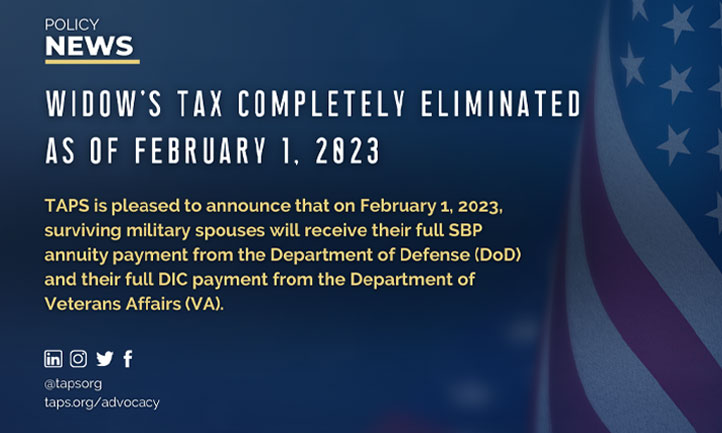Widow’s Tax Now Completely Eliminated
Author: Candace Wheeler

TAPS Policy News: TAPS is pleased to announce that on February 1, 2023, surviving military spouses will receive their full Survivor Benefit Plan (SBP) annuity payment from the Department of Defense (DoD) and their full Dependency and Indemnity Compensation (DIC) payment from the Department of Veterans Affairs (VA).
The SBP-DIC Offset, or Widow’s Tax, is completely eliminated, and future generations of surviving spouses will receive their full survivor benefits, amounting to millions of dollars in benefit payments.
For nearly five decades, as many as 66,000 surviving military spouses nationwide were denied their service members’ earned benefits. Since 1972, federal law required a $1 reduction in SBP for each $1 received in DIC, amounting to an average loss of $925 per month, or $11,000 annually.
The TAPS Government and Legislative Affairs Team
TAPS was instrumental in the fight to finally eliminate the Widow’s Tax. The TAPS Government and Legislative Affairs team, leading advocates for policy and legislation to strengthen military surviving families, worked with members of Congress, fellow veteran and military service organizations, and surviving spouses to successfully pass this critical and long overdue legislation.
 Candace Wheeler, Director, Government and Legislative Affairs and Ashlynne Haycock-Lohmann, Deputy Director, TAPS Policy and Legislation
Candace Wheeler, Director, Government and Legislative Affairs and Ashlynne Haycock-Lohmann, Deputy Director, TAPS Policy and Legislation
There have been many attempts to correct this injustice over the last 20-plus years, but what finally made the difference was the military and survivor community working together with a clear unified message and strategy. Surviving spouses contacted, called, and visited their members of Congress. They worked alongside survivor advocates from the military and veterans service organizations, including TAPS. They participated in Hill Days. They shared their stories with local and national media. They encouraged each other and never gave up!
With overwhelming bipartisan support from both houses of Congress, the legislation was signed into law on December 20, 2019, as part of the National Defense Authorization Act (NDAA) for Fiscal Year 2020. The SBP-DIC Offset was phased out over three years, beginning in January 2021 and ending in January 2023.
Your Voice Helps TAPS Advocate for You
Without YOUR voice this would not have been possible. Thank you for YOUR advocacy!
As we begin a new year, we ask you to continue to keep TAPS informed on the issues affecting you and your family, such as: remarriage, DIC, illness loss, suicide, mental health care, education, and more.
Your voices and stories make all the difference in our efforts to elevate survivor issues to policymakers. We encourage each of you to make YOUR voice heard in 2023. Contact our TAPS Government and Legislative Affairs team at policy@taps.org.
Frequently Asked Questions
What is Dependency and Indemnity Compensation (DIC)?
Surviving spouses of service members who died while on active duty, or military retirees who died of a service-connected cause, are eligible to receive Dependency and Indemnity Compensation (DIC) from the Department of Veterans Affairs (VA), which currently amounts to $1,562.74 per month, nontaxable.
What is the Survivor Benefit Plan (SBP)?
Service members choose to provide for their surviving spouses by purchasing a Department of Defense (DoD) annuity insurance policy, known as the Survivor Benefit Plan (SBP). Surviving spouses are entitled to receive those payments upon the death of their service member. Survivors of service members who die while on duty are covered automatically. In both cases, SBP annuities are taxable.
The NDAA for Fiscal Year 2020 was signed into law on December 20, 2019. What does this mean for surviving military families?
- The law included theelimination of the SBP-DIC Offset, or Widows Tax.
- The law applies to surviving spouses who qualify for both benefits.
- The law is not retroactive, and no back payments will be made.
- The elimination of the SBP-DIC Offset was phased in over three years.
What does the phase in look like?
- No changes took place in 2020.
- Beginning February 1, 2021, surviving spouses who qualified for both benefits had one-third of their SBP restored, in addition to getting the full DIC.
- Beginning in 2022, surviving spouses who qualified for both benefits had two-thirds of their SBP restored, in addition to getting the full DIC.
- Beginning in 2023, surviving spouses who qualify for both benefits will receive both their SBP and DIC in full.
What happens for surviving spouses who elected the child-only option?
- Surviving spouses were able to re-select SBP in their name permanently on January 1, 2023, and the child-only option was phased out.
- If a child previously aged out, surviving spouses were able to re-select SBP in their name permanently on January 1, 2023.
The Defense Finance and Accounting Services (DFAS) created a webpage SBP-DIC Offset Phased Elimination News. Here are a few key points shared on the DFAS website:
- SBP payments are paid the first business day of the month following the entitlement, so January 2023 SBP entitlement payments are made on February 1, 2023.
- Spouses should receive a January 2023 Annuitant Account Statement (AAS) near the time of their February 1, 2023, payment that will show the full SBP payment. The AAS is available in your myPay account.
- There will be no Special Survivor Indemnity Allowance (SSIA) payment because the SBP-DIC Offset will be fully eliminated beginning January 1, 2023.
- If a surviving spouse previously received a refund of SBP premiums paid due to the SBP-DIC Offset, they will NOT need to pay back that refund because of this change in the law.
- The "Repeal of Authority for Optional Annuity for Dependent Children" and "Restoration of Eligibility for Previously Eligible Spouses" in the National Defense Authorization Act (NDAA) only impact those spouses and children of service members who died on active duty when the surviving spouse previously elected to transfer the SBP annuity to a child or children. They do not affect previous or future SBP elections by retirees or SBP annuities for a retiree's beneficiaries.
Who do I contact if I have additional questions related to the Widows Tax, my SBP payment, or other benefits?
Our TAPS Casework team is available to answer any questions related to the Widows Tax and to help resolve any issues with managing benefits, records, and other paperwork. If you have questions related to your SBP payment or other benefits, please email casework@taps.org or call 800-959-TAPS (8277) and ask to speak with a member of our Casework Team.
Candace Wheeler is the Director, Government and Legislative Affairs for the Tragedy Assistance Program for Survivors (TAPS).
